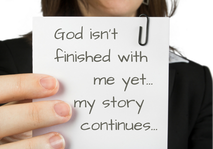Writing Your Testimony
A Testimony is a Story. Telling that story is one of the great privileges and opportunities we as Christians have. As you prepare your testimony consider the helps listed below that contains excerpts from material from the article “How to Write Your Testimony” by Shirley Loewen with Stacy Wiebe
As a child of God, you have a powerful story to tell. Sharing how you came to Jesus and the difference He's made in your life can help others discover how they, too, can know God personally. But how do you distill a lifetime of experiences into a few minutes and communicate the significance of your faith in a way others can understand? This is the challenge. This guide will help you develop a three-minute synopsis of your story that you can share with individuals or groups. A carefully prepared testimony, empowered by the Holy Spirit, can be a tool you can use anywhere to effectively share the message of God's love.

Getting Started
As you set out to gather ideas, begin by asking God to bathe the process with His Spirit, and give you wisdom as you write. Your objective at this point is to write freely without editing - to just get all your ideas on paper. The outline below will provide a solid frame to build your story on. Try to think of specific examples and details that relate to each question.
1. What was your life like before you trusted Jesus Christ as your Savior and Lord?
2. How did you come to accept Christ and give Him complete control of your life?
3. What happened after you trusted Christ?
As you set out to gather ideas, begin by asking God to bathe the process with His Spirit, and give you wisdom as you write. Your objective at this point is to write freely without editing - to just get all your ideas on paper. The outline below will provide a solid frame to build your story on. Try to think of specific examples and details that relate to each question.
1. What was your life like before you trusted Jesus Christ as your Savior and Lord?
- What were your attitudes, needs and problems?
- What did your life revolve around? What was most important to you?
- Where did you look for security, peace of mind and happiness?
2. How did you come to accept Christ and give Him complete control of your life?
- When did you first hear the gospel? When were you first exposed to dynamic Christianity?
- What were your initial reactions to Jesus Christ?
- When and why did you begin to feel positively about Christianity?
- What was the turning point in your attitude?
- What feelings did you struggle with right before your decision?
3. What happened after you trusted Christ?
- What changes did you see in your life? In your attitudes? In your actions?
- How long did it take before you noticed any changes?
- What does Jesus Christ mean to you now?

Threading It Together
During this second step, it's time to get selective and decide which details to include. Read through your ideas, and using a highlighter, underline the most important feelings, examples or incidents that relate to each of the three points in the outline above. Use the ideas you highlight to begin writing your story, and make sure you explain what your life was like before you knew Christ, how you came to know Him, and what your life is like now.
These guidelines will help you shape your story:
During this second step, it's time to get selective and decide which details to include. Read through your ideas, and using a highlighter, underline the most important feelings, examples or incidents that relate to each of the three points in the outline above. Use the ideas you highlight to begin writing your story, and make sure you explain what your life was like before you knew Christ, how you came to know Him, and what your life is like now.
These guidelines will help you shape your story:
- Begin with an attention-getting sentence or incident.
- Be positive from start to finish.
- Be specific. Give enough detail to arouse interest.
- Be realistic. Do not imply that Christ removes all of life's problems, but, rather, that He walks with you through them.
- Use one or two scripture verses, but only where they would directly relate to your experience and fit in naturally.
- Edit and rewrite as needed. Consider writing your first draft and setting it aside for a day so you can go back to it with a fresh perspective.
- Write a conclusion that makes your testimony sound finished and complete. There are certain things you should filter from your story to avoid detracting from its essential message.
- Don't harshly criticize the church, organizations or other people.
- Avoid mentioning denominations; the concept of different kinds of churches can be confusing to non-Christians.
- Be careful not to glamorize how 'bad' you used to be.
- Steer clear of vague terms such as 'joyful,' 'peaceful,' 'happy' or 'changed unless you explain in a concrete way what you mean.
- Do not use Christian jargon such as 'saved,' 'convicted,' 'born again,' 'sin,' or 'repentance' without clarification.

Telling Your Story
It might seem tough the first time or two, but the more you share your story, the easier it will get. Most people will appreciate your willingness to talk openly about your life, and no one can argue with your personal experience.
Beware of nervous mannerisms that can distract others as they listen to your story, such as rubbing your nose, swaying, jingling coins in your pocket, playing with a pencil, clearing your throat or using many 'you knows' and 'uhs.'
Also, remember that a testimony should never be a 'preachimony.' Stay humble; never argue or use high pressure methods to persuade people to make decisions for Christ.
It might seem tough the first time or two, but the more you share your story, the easier it will get. Most people will appreciate your willingness to talk openly about your life, and no one can argue with your personal experience.
- Rehearse your testimony until it becomes natural. Practice sharing it with a Christian friend or family member.
- Share your story with enthusiasm, in the power of the Holy Spirit.
- Smile often. Ask the Lord to give you a pleasant expression.
- Speak clearly, in a natural, relaxed tone. Speak loudly enough to be heard.
- Stick to your time limit. Go too long and you'll lose your audience.
- Tailor your story to your audience. Use examples from your experience that will relate to theirs.
Beware of nervous mannerisms that can distract others as they listen to your story, such as rubbing your nose, swaying, jingling coins in your pocket, playing with a pencil, clearing your throat or using many 'you knows' and 'uhs.'
Also, remember that a testimony should never be a 'preachimony.' Stay humble; never argue or use high pressure methods to persuade people to make decisions for Christ.

Keep It Fresh
New chapters of your life are being written all the time, so in one sense, your story is never complete. Feel free to add new content and revise to keep your testimony fresh and reflect God's ongoing work in your life.
Ask God to give you opportunities to tell your story, and look for openings. People you meet may comment that there's something different about you, or even ask you why you're such a 'religious' person. Such situations are windows of opportunity to tell your story of faith. Besides sharing your story one-on-one or in group situations, consider putting your testimony in written form to give to people you meet. You could even publish it on your home page on the Internet. Be creative! And enjoy sharing with others the incredible story of what Jesus, the author and finisher of our faith, is doing in you!
Permission granted by:
K. J. Kehler Director, Retirement With A Purpose
www.retirementwithapurpose.com
New chapters of your life are being written all the time, so in one sense, your story is never complete. Feel free to add new content and revise to keep your testimony fresh and reflect God's ongoing work in your life.
Ask God to give you opportunities to tell your story, and look for openings. People you meet may comment that there's something different about you, or even ask you why you're such a 'religious' person. Such situations are windows of opportunity to tell your story of faith. Besides sharing your story one-on-one or in group situations, consider putting your testimony in written form to give to people you meet. You could even publish it on your home page on the Internet. Be creative! And enjoy sharing with others the incredible story of what Jesus, the author and finisher of our faith, is doing in you!
Permission granted by:
K. J. Kehler Director, Retirement With A Purpose
www.retirementwithapurpose.com
| printable download |

